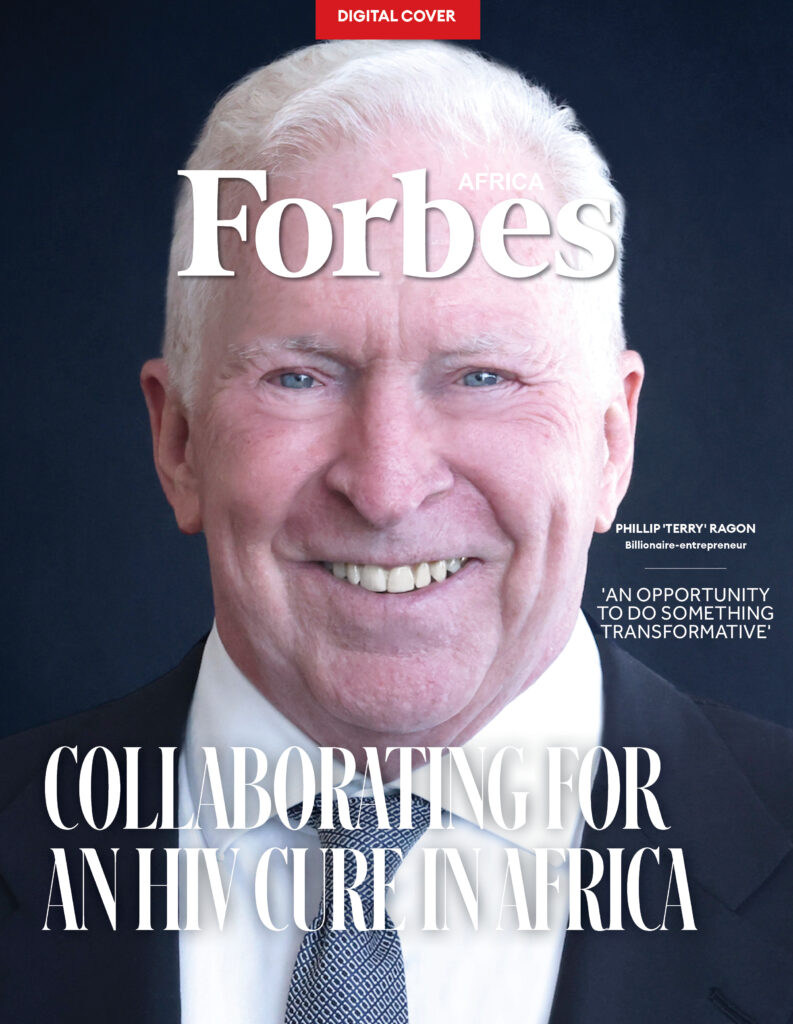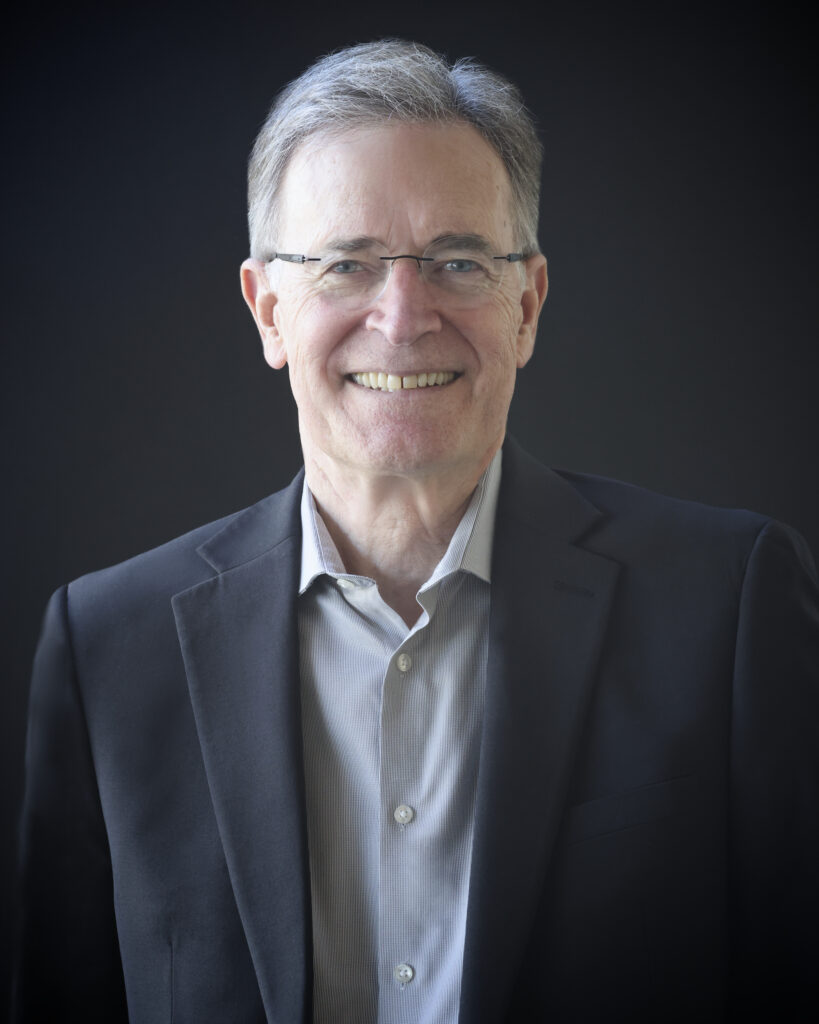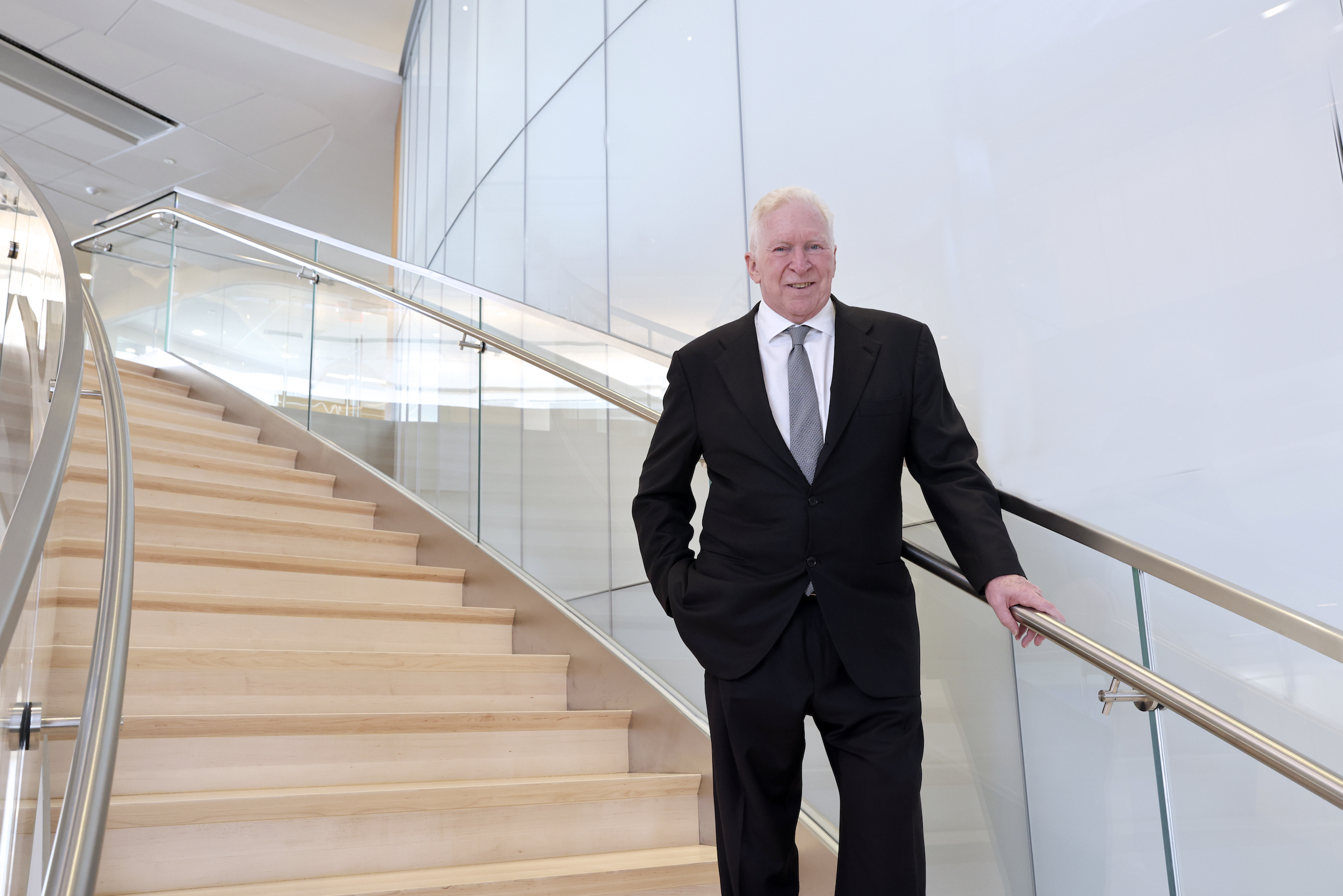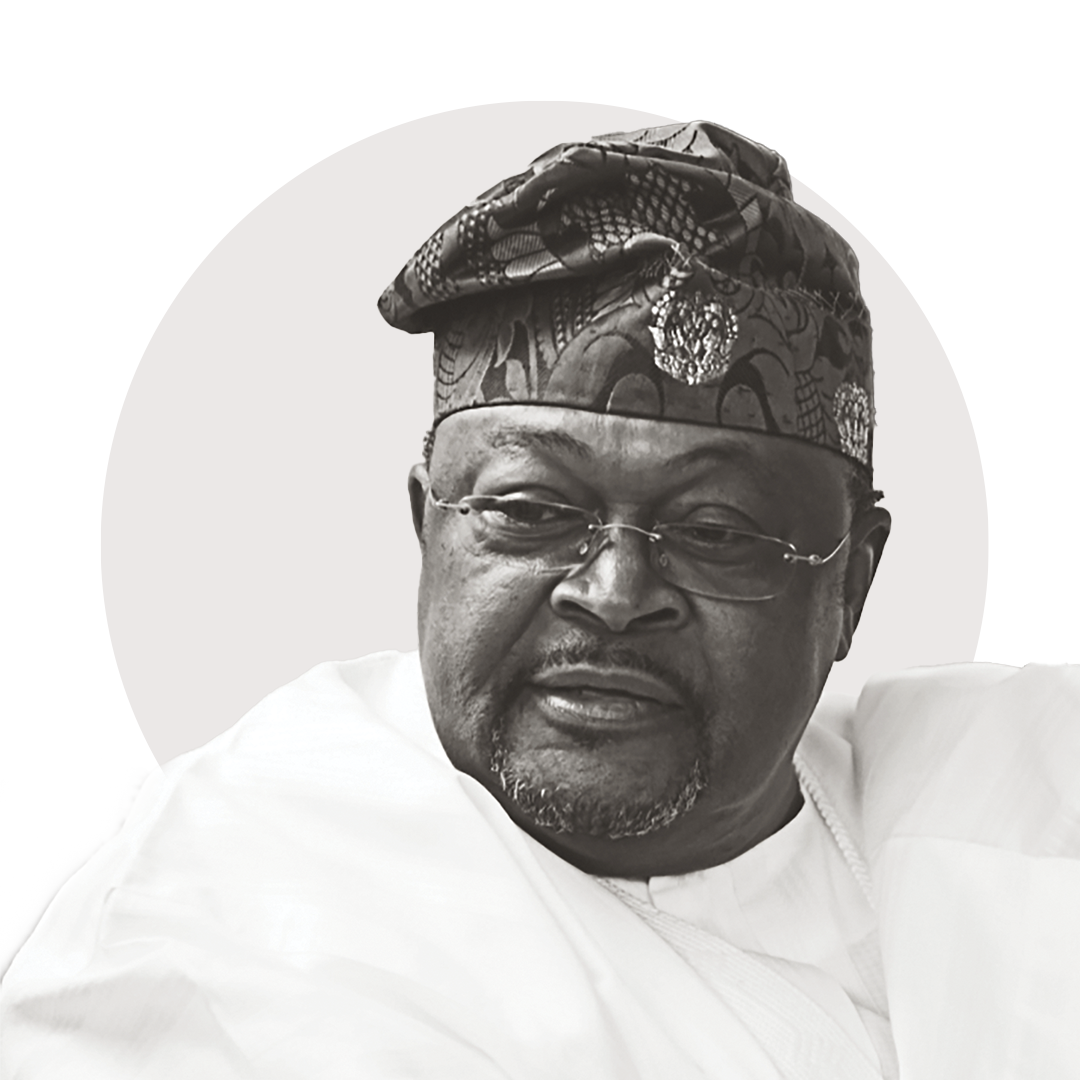With strategic collaborations, targeted funding, and growing investment in science, Africa holds immense potential in spearheading the future of global healthcare. Among those taking the lead to develop a cure for HIV, through these partnerships, and with millions in investment through the Ragon Institute, is an American billionaire named Phillip ‘Terry’ Ragon, who we get a rare audience with. He speaks about his belief in African-led science and why a breakthrough is within reach.

In a lab in the heart of South Africa’s KwaZulu-Natal province, a quiet revolution in HIV research is underway. Over 8,000 miles away in Massachusetts in the United States (U.S.), philanthropist and billionaire-entrepreneur, Phillip ‘Terry’ Ragon is reflecting on why the work in Africa is so important, not just for him, but for the future of global health.
Through scientific coalitions and collaborations, Ragon is helping unlock answers in a region with the heaviest incidence of AIDS, while empowering local researchers to lead the charge toward a cure.
“If you achieve a vaccine for HIV, you’ll be able to really transform lives, save millions of people. It would be pretty special if you could accomplish that,” Ragon says simply, on a Zoom call with FORBES AFRICA in late April. “We were taking on the very hardest infectious disease by far; and I knew that we wouldn’t just get lucky. We were going to have to develop new science, engineering, technologies and, if we were successful at finding a vaccine, then, most likely, we would be able to solve a range of other diseases at the same time.”
Ragon has dedicated his life to healthcare. Not one to bask in the spotlight, he is candid about the respect he has for his team and business partners on the ground in Africa, all of whom have adopted a common goal to tackle one of the most debilitating viruses on earth. And this is why he is focused on the continent.
Loading...
Health research in Africa is at a critical juncture. And while stakeholders weigh up the costs of cuts in funding, including the ‘dismantling’ of the United States Agency for International Development (USAID)–which has already seen several projects grind to a halt–the continent’s potential as well as its collaborative efforts must come to the fore.
One such collaboration is between the African Health Research Institute (AHRI) and Ragon’s U.S.-based Ragon Institute, resulting in the first HIV cure trial in Africa.
Partnerships With A Purpose
It is estimated, by the World Health Organization, that there are 25.6 million people living with the human immunodeficiency virus (HIV), the virus that causes AIDS, in the African region.
The Ragon Institute, founded in 2009 with an early emphasis on HIV/AIDS research, is a partnership between Mass General Brigham–an integrated healthcare system, the Massachusetts Institute of Technology (MIT) and Harvard University.
Supported by the Phillip T. and Susan M. Ragon Foundation, it’s the brainchild of Ragon, who is also the CEO of InterSystems, a data management solutions company based in Massachusetts. His net worth, according to Forbes, is an estimated $3.5 billion.
However, collaborative efforts between Massachusetts General Hospital (MGH), a founding member of Mass General Brigham, and the continent precede this.

It was in 1998 that, through MGH, Dr Bruce Walker, Founding Director of the Ragon Institute–and whose particular focus includes HIV, virus-specific T-cells and elite controllers–and his team first formed partnerships with scientists in South Africa’s KwaZulu-Natal province.
According to the Ragon Institute, this collaboration was about more than research; the focus was on building local capacity and infrastructure. Five years later, the Doris Duke Medical Research Institute was established at the University of KwaZulu-Natal, serving as a training ground for scientists on the continent and providing them with the space they needed to conduct research autonomously.
Speaking to FORBES AFRICA, Dr Walker explains their goal was always to support African leadership and allow the facilities to have their own identities.
It was only in 2007 that he was introduced to Ragon, which was also the first time the latter had visited South Africa.
“The reason I went, first of all, was Bruce was telling me what he was doing. Intellectually, I understood everything he was saying but I didn’t quite understand why he was doing what he was doing,” recalls Ragon.
“I got to sit in as [a physician] examined three patients. All three were young women–probably late teens, maybe early 20s–all three had HIV, and all three were dying. It was really quite intense.”
Ragon initially felt as though there was enough investment in HIV research at the time and that it would be a waste to get involved.
“[Bruce’s] exact words were, ‘let’s not be hasty’. We sat at the airport and he told me of a dream he had–to create this coalition of scientists all over the world that were the best in their fields, and have them all help work on this important problem. I said to him, ‘that’s really a harebrained idea but there’s an aspect to it that’s intriguing’.
“So, I agreed to fund a very small project that he was doing with somebody else, just to understand more about this whole field. Then, over the course of a year, I really came to understand that there were opportunities to do things that would be transformative.”
Ragon, who was born in Arizona in the U.S., acknowledges that he was fortunate growing up, and that he always felt a need to help people.
“I [got] to spend my senior year of high school in South America, in Bogotá, Columbia. What really struck me was that, at that time, there was really intense poverty… that really made an impression on me,” he states.
“I went back and, initially, I helped build some schools for the kids in that community in Bogotá, and it just never felt like enough, which is why eventually I wound up finding myself with Bruce in Africa.”
After completing his studies at MIT, and a stint in London in the U.K., in which he jokes he had dreams of being a rock star that didn’t materialize, Ragon ended up working at a company that produced software for healthcare. This was his first foray into the industry and he has never looked back.
“To be honest, I never dreamed of being a billionaire. It was never a goal of mine. A few years back, somebody asked me, ‘did you ever expect the company to get this big?’ And the only thing I could think of saying was, ‘I just never thought I’d be this old’,” says the unassuming billionaire with a laugh.
“My plan somehow went awry, because 30 came and went; 40 came and went; and now, I’m 75 and I’m still here. I didn’t start 10 or 20 companies, but I’ve enjoyed building this one, and it’s really interesting to grow along with it as it goes through each phase.”
In 2019, MGH received $200 million from philanthropists, including the Ragons, to endow the institute, MIT, and Harvard, to strengthen and secure the future for the institute’s scientists. This was in addition to a $100 million commitment, secured when the fund was established.
At the time of the second contribution, Dr Walker stated that solving difficult health problems demands creative thinking from top scientific minds and that different fields would need to come together to tackle the problem. He also said that this required flexible funding to enable innovative ideas to move forward quickly.
Dr Walker reiterates to FORBES AFRICA: “[HIV] is a very complicated disease, and many of the diseases that we study are very complicated… so approaching these in the traditional manner, where you have a scientist working alone in a lab with a few trainees, is not the way we’re going to solve this problem. We’re going to solve it through collaboration and through bringing all available knowledge to the problem.”
The institute has since expanded to include research on vaccines for other diseases of global importance, such as malaria, TB, the flu, Covid-19, as well as therapies for cancer and autoimmune disorders.
It is also part of the National Institutes of Health’s (NIH) HIV Vaccine Trials Network and has working relationships on infectious disease studies with groups in Botswana, Zambia, India and China.
“We’ve spent 27 years building up collaborations, working with those collaborators to build capacity, identify sources of funding, and train people, with the goal of improving health. Africa is well-positioned now to contribute to that, and yet it’s being jeopardized by the lack of funding,” Dr Walker says.
“Africa needs to be a leader in scientific discovery and in biomedical research; they have incredible resources in terms of people–outstanding people that we have been blessed to be able to be involved in training. That is not something that just involves health, but is an economic engine for the countries themselves.”
He adds that it’s really about showcasing the opportunities available on the continent to make a difference in the lives of its people.
Taking The Lead
Reported data indicates that over eight million people in South Africa, in particular, are living with HIV. Further to this, in 2023/2024, there were an estimated 178,000 new HIV infections and 105,000 deaths among people with HIV.
However, efforts are underway to tackle this communicable disease.
In March, the AHRI announced the findings of its HIV cure trial, indicating that 20% of trial participants remained off antiretroviral therapy (ART) and virally-suppressed after a year and a half.
The trial, and subsequent study, conducted in KwaZulu-Natal, utilized a combination immunotherapy approach in an effort to eliminate or reduce traces of HIV in the human body. This would allow the immune system to keep the virus at bay without the need to take lifelong medication.
Further to this, 20 women were enrolled in the trial–a notable point considering that women are disproportionately affected by the virus in Africa.
According to AHRI, six of the participants, or 30%, stayed off HIV treatment for almost a year, while four of the women remained off treatment until the trial ended at 55 weeks. It also noted that these four women have continued without medication for an average of one and a half years, as they are still being monitored.
Professor Thumbi Ndung’u, the Director for Basic and Translational Science at AHRI and an HIV/AIDS researcher, explains to FORBES AFRICA that one of the next steps in this study is to understand why the trial worked for some of the women and not others, and to establish the right mechanisms.
“We are exploring other regimens that might actually work better. At the moment, we don’t know which regimens are best for inducing new immune responses. It could be vaccines; it could be broadly neutralizing antibodies–which is what we used in our study–but also very powerful neutralizing antibodies have come up; it could be other products that boost the immune system.
“We are thinking of doing other studies in future that we hypothesize to be better, but obviously you never know until you actually test a product to see whether it works.”
Research related to HIV requires a multipronged approach as those who are immunosuppressed are often susceptible to other infections such as tuberculosis (TB), as an example.
Professor Ndung’u emphasizes that research on this communicable disease really is a global effort–alluding to the fact that many other groups are also working on products that can be used in human studies–and the importance of investment and collaboration.
“Africa has immense potential because it has a young population, so the potential for productivity, growth and impact is much bigger in Africa than anywhere else. In order for that potential to be fully realized, what we need, in my view, is investment,” he explains.
“There is room for investment from outside the continent in order to catalyze growth and innovation–that’s absolutely needed–but we also need homegrown investment and homegrown solutions. What we need is to be able to convince our own governments and philanthropists to step forward and be counted in terms of real investment in African science, African innovation and in Africa’s future. It is possible.”
Trials such as these further emphasize that research can be done in resource-limited settings, while showcasing the potential of healthcare development on the continent. As the experiments in KwaZulu-Natal herald a new turning point in HIV research, what’s needed is the scientific will to keep going, and the conviction, as Ragon attests, that a cure may be closer than ever.
The Reality On The Ground
“Seeing more and more new infections in younger people.”
As per WebMD, the first cases of severe immunodeficiencies were reported to the Center for Disease Control (CDC) in 1981. Then, in 1987, the first antiretroviral drug–FDA-approved, Zidovudine (AZT)–was used to treat HIV.
Fast forward to the present day, where African research in health is moving forward in leaps and bounds, aided by innovation and technology. And long-term funding is a key part of this.
According to reports, South Africa received $453 million, in 2024 alone, in direct funding from the U.S. under the country’s President’s Emergency Plan for AIDS Relief (PEPFAR).
And yet, following several developments in the sector, HIV and TB-related research in the country seems to be at risk. This is as per a joint analysis, published in May, from Doctors Without Borders/Médecins Sans Frontières (MSF) and Treatment Action Group (TAG).
It indicates that 39 South African clinical research sites related to the two diseases are under threat due to potential NIH funding cuts, placing at least 24 HIV trials and 20 TB trials at risk. The NIH is the largest public funder of biomedical research in the world, and reportedly invests more than $32 billion a year.
The MSF and TAG analysis further explains that, regarding HIV in particular, “trials at risk include cure-related protocols involving broadly neutralizing antibodies (bNAbs) and analytical interruptions of antiretroviral therapy–for both adults and infants, studies to promote treatment adherence for youth, and trials of innovative preventive vaccine modalities designed to induce bNab production”.
Commenting on the analysis, Dr Tom Ellman, director of MSF’s Southern Africa Medical Unit said in a statement: “For years, South Africa has spearheaded the research and development of critical innovative medical tools for the prevention, diagnosis, treatment, and care of HIV and TB, which have saved lives not just within South Africa’s borders, but also in communities worldwide”.
“If the research work of tackling these two infectious diseases—including for the most vulnerable—is stalled, we risk losing hard-won progress. These cuts are especially devastating since they come at a time when funding for TB and HIV programing has also been reduced.”
Dr Githinji Gitahi, Group CEO at Amref Health Africa, a Kenya-based health NGO, explains that there has been progress due to investment in treatment and prevention but education is still necessary, especially among the younger generation on the continent.
“Mobility on HIV has reduced. Death from HIV/AIDS has reduced. We still have the same number; we have a new problem that’s arising and that is the adolescent problem, where we are seeing more and more new infections in younger people,” he tells FORBES AFRICA.
“I would say that more than 40% of new infections, in most of the countries, would be from people between 19-and 24-years [old]–that’s a new problem that we have to deal with, because the education and security, education and prevention message got lost.”
HIV research is especially critical, Dr Gitahi emphasizes, as it’s classified as a treatable chronic disease yet treatment costs are high, with estimates that development assistance provides about $2,000 per person per year for treatment and care. This becomes especially costly in a country like South Africa with an estimated eight million people with HIV.
While the importance of research funding cannot be overemphasized, he believes it cannot come from government alone as biomedical research for products is usually driven by economic incentives.
“[These] incentives are only afforded by those who have an interest in the success of their research in terms of economic viability and return on investment. Now, governments in Africa cannot afford to fund their own pharmaceuticals–[it’s] billions of dollars to finance the areas of the interest.”
South African epidemiologist, Professor Quarraisha Abdool Karim agrees that research is a big investment but emphasizes to FORBES AFRICA that there are ways for governments to invest and get involved, perhaps through education and ensuring that the correct infrastructure is in place.
“Skilled personnel not only benefit industry and the private sector, [they] also benefit the world. We export talent and don’t talk about how our skilled personnel from the Global South, from Africa, are actually staffing hospitals, clinics and schools outside [the country],” says Karim, who is also a co-founder and Associate Scientific Director at CAPRISA.
“It’s an asset that we don’t get credit for; that we’re training people who go to other countries. We should be getting returns and reinvesting in that. This perception that Africa is a big begging bowl is absolutely not true. It may have been true at some point, but that perception and the perpetuation of that myth needs to be fixed.”
Professor Ndung’u believes that the socio-economic development of Africa is something that has been well articulated at various bodies and the continent needs to encourage science-based economic development.
“We, at the African Health Research Institute, are doing cutting edge research that could lead to new products, could lead to new drugs, as we have demonstrated in our HIV cure work. The future belongs to young people, and if we don’t train [them] with the skills that they need for the future, we’ll be failing in our efforts to combat diseases and improved health will not be sustainable.”
He adds that the best approach would be to do cutting edge science to innovate and develop new products on the one hand, and to develop a critical mass of investigators who are highly skilled, and who can take the continent into the future, on the other.
“…new technologies, including, for example, computational biology as well as artificial intelligence; all these are skills that are needed on the African continent in order for us to become not just consumers of products, but actually to become people who can come up with innovations,” he says.
This would also push the continent to take charge of its future, while minimizing a heavy reliance on external funding and an ever-changing political landscape.
It was in January, just after U.S. President Donald Trump took office that the global health sphere began to shift. He initiated the process to withdraw the country from the WHO and issued a stop-order, pending a 90-day review, of all USAID programs.
Professor Karim notes that co-operation and relations between countries take a fair amount of time to establish; therefore, the suddenness of the cuts in funding and subsequent termination of several programs, will have an impact on reestablishing those relationships.
In terms of mitigation plans for the funding cuts, she adds that they have to come from within the continent rather than from outside it: “We can’t be bullied into making decisions that will cost us many generations. This is where science [is of] importance, and how governments recognize it, how the private sector recognizes it, how society recognizes it”.
“We all need to be working together in terms of supporting the decisions that need to be made.”
Loading...





















